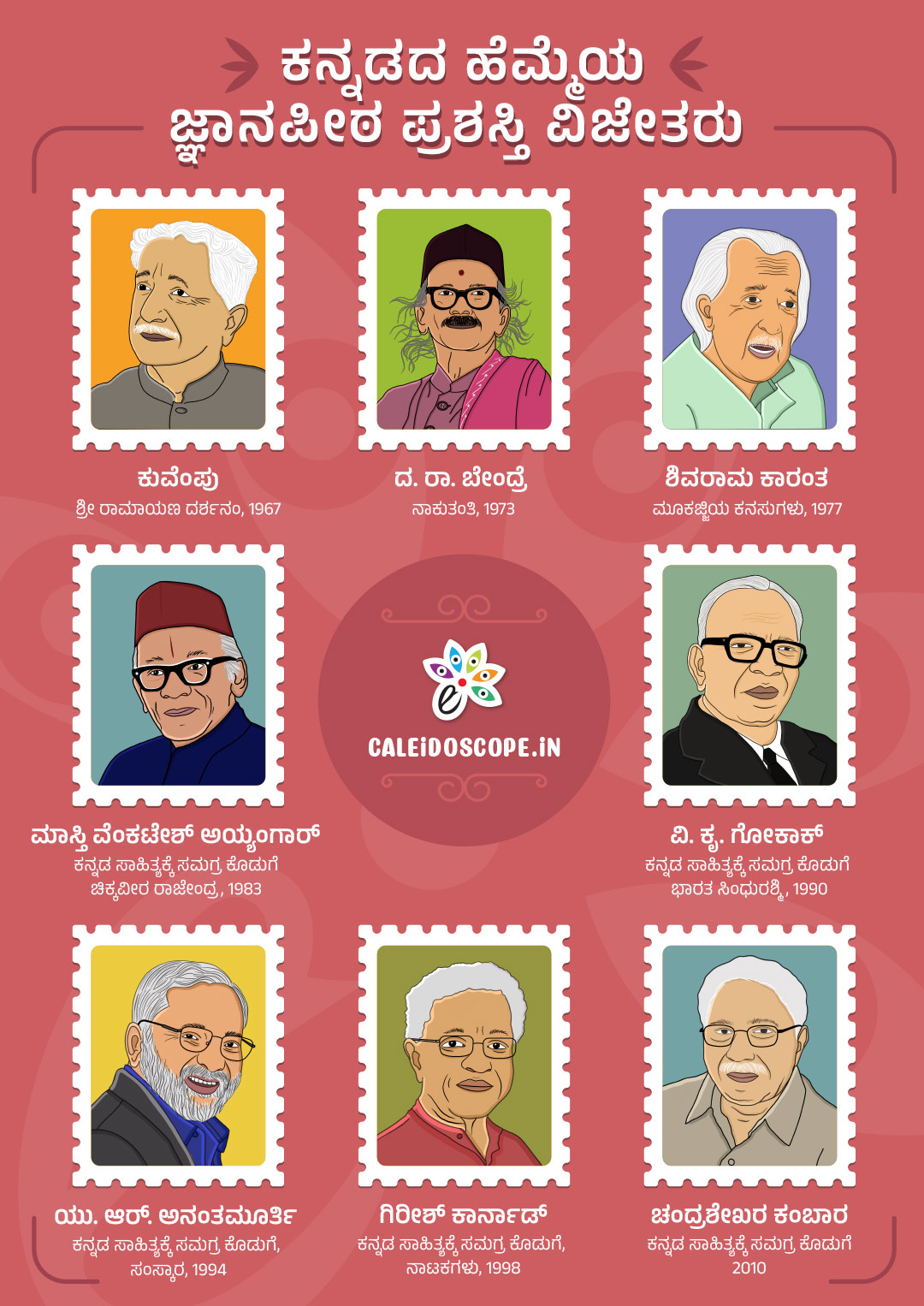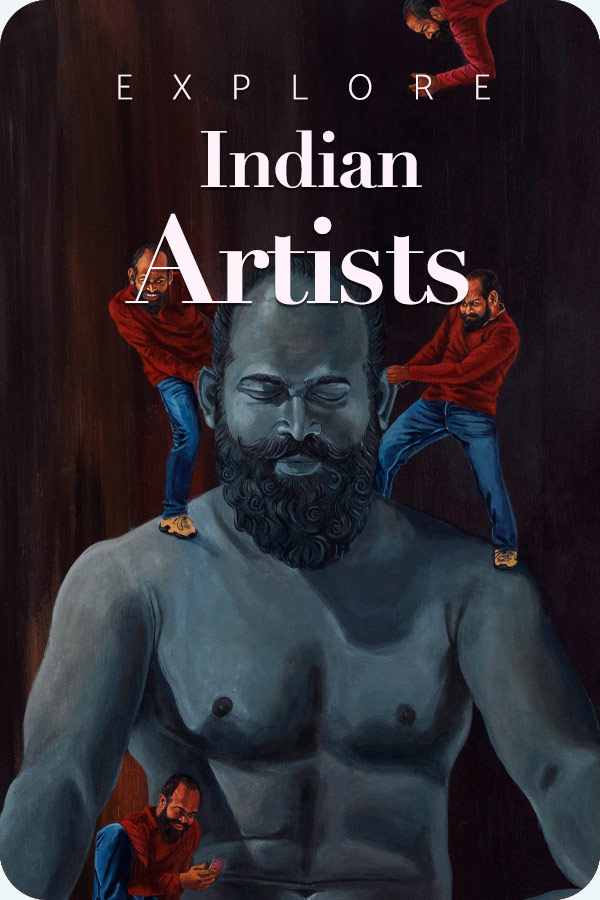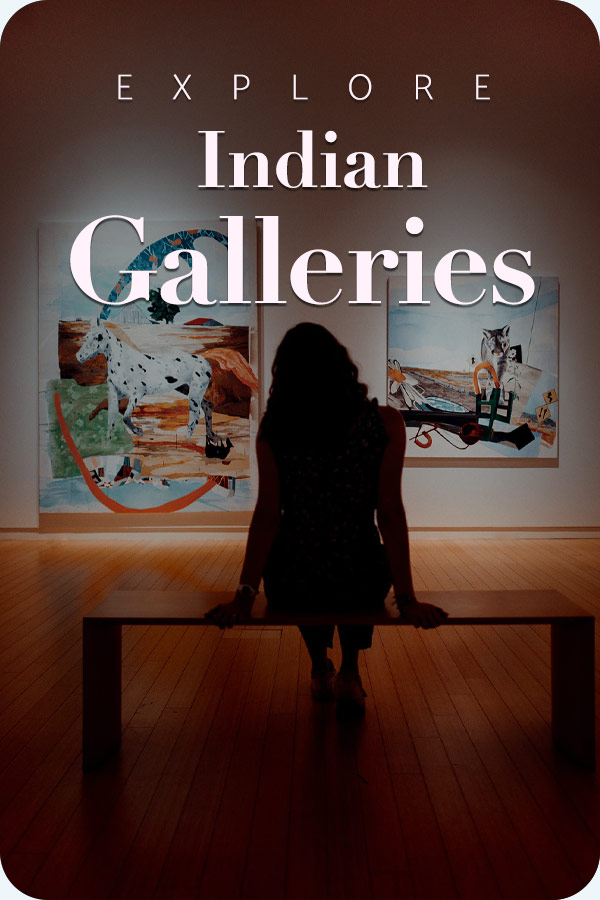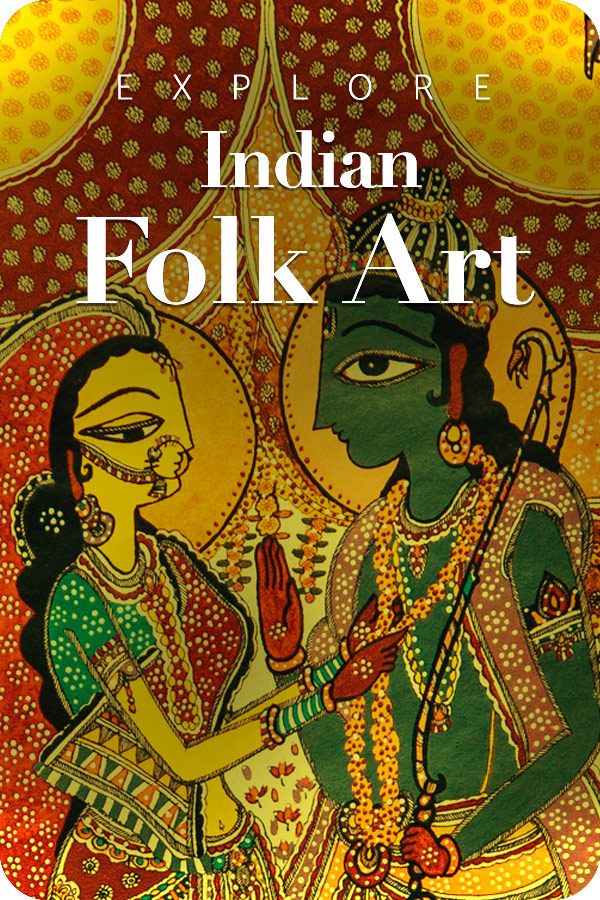Introduction
The Jnanpith Awards are one of the greatest literary prizes of India founded in the year 1961 by the Jnanpith Foundation, a non-profit organisation that recognises writings in any of the officially recognised Indian languages in order to honour authors’ significant contributions to the field of Indian literature.
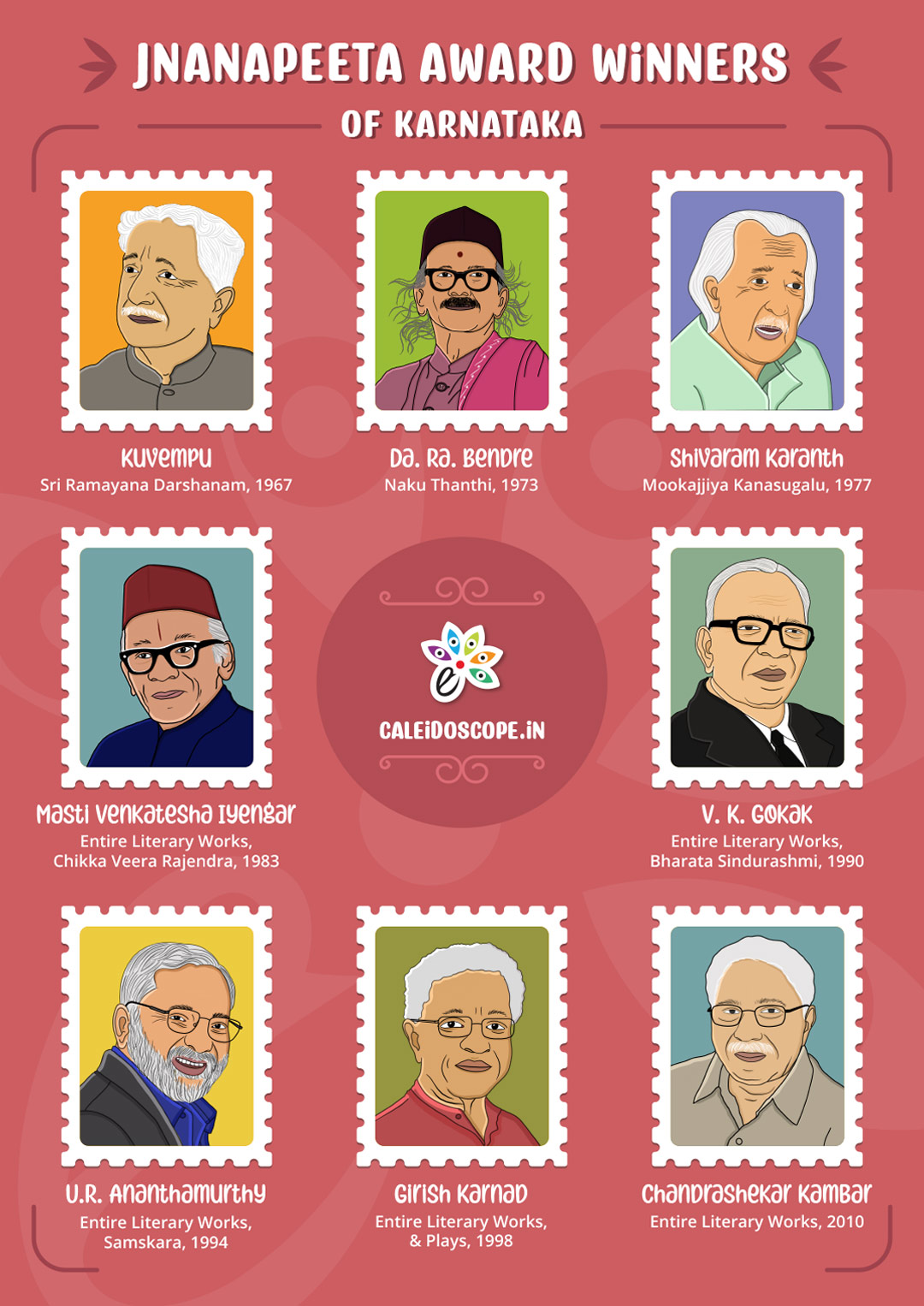
The awards span a wide range of categories, including Arts and Literature, Science and Technology, Social Impact, Business and Entrepreneurship, and Environment and Sustainability, acknowledging exceptional contributions in each area. The accomplishments, uniqueness, influence, and likelihood that their work may inspire others are taken into consideration while choosing the winners. A group of eminent judges who are authorities in their domains assess the candidates and choose the winners.
What is the History of Jnanpith Awards?

- The word Jnanpith comes from combining the Sanskrit terms “Jnan” (ज्ञान, knowledge) and “Pith” (पीठ, throne), which refers to a place where creativity and knowledge are nurtured.
- Sahu Shanti Prasad Jain, the founder of the Bharatiya Jnanpith, turned 50 on May 22, 1961, which marked the beginning of the award ceremony.
- The Jnanpith Award, highest literary honor includes a bronze statue of Saraswati, the Hindu goddess of learning and knowledge, a citation plaque, and cash of around ₹11 lakhs.
- Prior 1982, the prize was awarded for a single work by a writer; since then, it has recognized a writer’s lifetime contribution to Indian literature.
- Kannada is ranked second in terms of Jnanpith awards, while Hindi holding the highest at 11. Kannada was the language that received the most awards till 2005.
List of Jnanpith Award Winners of Karnataka
| Poet/Writer Name | Award Year & Celebrated Works |
|---|---|
| Kuvempu | Awarded in 1967 for his epic poem “Sri Ramayana Darshanam”, a modern retelling of the Ramayana in Kannada. |
| D. R. Bendre | Awarded in 1973 for his anthology of poems “Naku Thanthi”, reflecting his contribution to modern Kannada poetry. |
| Shivaram Karanth | Awarded in 1977 for his novel “Mookajjiya Kanasugalu” (Mookajji’s Dreams), a significant work in Kannada literature. |
| Masti Venkatesha Iyengar | Awarded in 1983 for his contribution to Kannada literature with special mention to novel “Chikka Veera Rajendra”. |
| V. K. Gokak | Awarded in 1990 for his contributions to Kannada literature and “Bharata Sindurashmi”. |
| U. R. Ananthamurthy | Awarded in 1994 for his literary works and novel “Samskara”, exploring contemporary issues of identity and tradition in Indian society. |
| Girish Karnad | Awarded in 1998 for his contributions to Kannada literature and Indian theatre. |
| Chandrashekhara Kambara | Awarded in 2010 for his contributions to Kannada literature. |
An In-depth Look at Jnanpith Award Winners of Kannada
The Jnanpith Award is a great honour conferred to the Kannada language, and it has gone to various notable writers. With their varied and influential works, these laureates have significantly enhanced Kannada literature.
1. Kuvempu – 1967, The First Kannada Jnanpith Award Winners :

Click here to view Kuvempu Details
| Poet/Writer | Details |
|---|---|
| Full Name | Kuppali Venkatappa Puttappa |
| Pen Name | Kuvempu |
| Birth Place | Hirekodige, Koppa, Chikmagalur, Karnataka |
| Birth & Death Date | 29th December 1904 – 11th November 1994 |
| Literary Movement | Navodaya (New Era) Movement |
| Jnanapith Award Year | 1967 |
| Awarded for the Book | “Sri Ramayana Darshanam” |
| Notable Works | Sri Ramayana Darshanam, Kaanuru Heggaditi, Malegalalli Madumagalu, Pakshikashi |
| Notable Awards | Jnanapith Award, Sahitya Akademi Award, Padma Bhushan, Karnataka Sahitya Academy Award, Nadoja Award |
- Kuppali Venkatappa Puttappa well known as Kuvempu is the first Kannada writer to receive the Jnanpith Award in the year 1967. Kuvempu fills several pages in the history of Kannada literature as a poet, playwright and novelist.
- His works described humanism, nature and the spirit of simplicity, drawing inspiration from the Indian epics and philosophy. Sri Ramayana Darshanam composed by Kuvempu is a modern rendition of the the epic Ramayana in poetic form is a great classic in Kannada literature.
- Some of the other works include Kanooru Heggadithi, Malegalalli Madumagalu which captures the themes of Malenadu Karnataka. Thus, through poetic vision Kuvempu presented the world of ‘Vishvamanava’, The Universal persona free from caste, creed and religion; which made Kuvempu’s literature timeless.
2. Dattatreya Ramachandra Bendre – 1974

Click here to view Da. Ra. Bendre Details
| Poet/Writer | Details |
|---|---|
| Full Name | Dattatreya Ramchandra Bendre |
| Pen Name | Ambikātanayadatta |
| Birth Place | Dharwad, Karnataka |
| Birth & Death Date | 1st February 1896 – 26th September 1981 |
| Literary Movement | Navodaya |
| Jnanapith Award Year | 1974 |
| Awarded for the Book | “Naaku Tanti” (A collection of poems) |
| Notable Works | Sakheegeeta, Naadaleele, Kannada Meghadoota, Gangaavatarana, Arulu-Maralu and Naaku Tanti |
| Notable Awards | Jnanapith Award, Sahitya Akademi Award, Padma Shri, Karnataka Sahitya Academy Award |
- One of the finest poets of Kannada literature Dattatreya Ramachandra Bendre, awarded Jnanpith in 1974 has a more significant place. D. R. Bendre was born in 1896 and his poems are filled with Artistic passion blended with thoughtful philosophical themes.
- The works of Bendre encompass love, nature and different layers of life capturing the richness of human experience through his poetry. Some of his famous creations are ‘’Naaku Tanti’’ and ‘’Sakhigeeta’’ for reasons like the strong use of Kannada and the new poetic form.
- Bendre’s contribution to Kannada literature is enormous, because he introduced new thinking and modern outlook to Kannada Poetry.
3. Shivaram Karanth – 1977

Click here to view Shivaram Karanth Details
| Poet/Writer | Details |
|---|---|
| Full Name | Shivaram Karanth |
| Pen Name | No Pen Name Used |
| Birth Place | Puttur, Dakshina Kannada, Karnataka, India |
| Birth & Death Date | 10th October 1902 – 9th December 1997 |
| Literary Movement | Navodaya |
| Jnanapith Award Year | 1977 |
| Awarded for the Book | “Mookajjiya Kanasugalu” |
| Notable Works | “Mookajjiya Kanasugalu”, “Marali Mannige”, “Chomana Dudi, “Mai Managala Suliyalli”, “Prani Prapancha” |
| Notable Awards | Jnanapith Award, Sahitya Akademi Award, Padma Bhushan, Karnataka Sahitya Academy Award, Sangeet Natak Akademi Award |
- In 1977 for the first time a doyen of many talents Shivaram Karanth of Kota was chosen to receive the Jnanpith Award. Even though Karanth dominated and wrote a lot, he was also a painter, a filmmaker, an environmentalist, and a social reformer. The novels, short stories, plays, essays that he wrote contain the reflection of his extensive knowledge about the people and the surroundings.
- Karanth’s novel Mookajjiya Kanasugalu stands as the pinnacle of his literary brilliance and creative vision. The novel, which got the Jnanpith Award for the year 1980-81, revolves around the hallucinations of an old woman “Mookajji” character and she unveils what she sees in mystical visions to her grandson.
- Most of Karanta’s creations deal with the cultural and social aspects with spearheading changes in the state of Karnataka, controversial subjects of caste prejudice, women’s liberation, and protection of the environment.
4. Masti Venkatesha Iyengar – 1983

Click here to view Shivaram Karanth Details
| Poet/Writer | Details |
|---|---|
| Full Name | Masti Venkatesha Iyengar |
| Pen Name | Srinivasa |
| Birth Place | Hungenahalli Malur taluk, Kolar district |
| Birth & Death Date | 6th December 1891 – 22nd February 1986 |
| Literary Movement | Navodaya |
| Jnanapith Award Year | 1983 |
| Awarded for the Book | “Chikkaveera Rajendra” |
| Notable Works | Rangana Maduve, Kakanakote, Yashodhara, Chikaveera Rajendra |
| Notable Awards | Jnanapith Award, Padma Bhushan, Sahitya Akademi Award |
- Masti Venkatesha Iyengar better known as Masti and one of the most outstanding writers in Kannada literature was honored with the Jnanpith in 1983. Masti was a master storyteller, known for his graceful narrative style rooted in classical traditions. His writing style is simple and elegant, yet the depth of the ideas he develops is considerable and they incite in readers a deep understanding of people’s essence.
- The short stories of Masti are famous for their bang on representation of Karnataka’s rural life along with human interaction. His novel “Chikavira Rajendra” which fetched him a Jnanpith award is a historical point of view describing the fall of the last king of Kodagu.
- The themes that dominate Masti’s works provide evidence of his sensitive perception of everyday struggles of the working population.
5. V. K. Gokak – 1990

Click here to view V. K. Gokak Details
| Poet/Writer | Details |
|---|---|
| Full Name | Vinayaka Krishna Gokak |
| Pen Name | Vinayaka |
| Birth Place | Savanuru Taluk, Haveri District of Karnataka |
| Birth & Death Date | 10th August 1909 – 28th April 1992 |
| Literary Movement | Navodaya |
| Jnanapith Award Year | 1990 |
| Awarded for the Book | “Bharatha Sindhu Rashmi” |
| Notable Works | Bharatha Sindhu Rashmi, Samarasave Jeevana, Dyava Pruthvi |
| Notable Awards | Jnanapith Award, Padma Shri, Sahitya Akademi Award, Kannada Sahitya Academy Award |
- Noted poet, critic and scholar, Vinayaka Krishna Gokak was awarded the Jnanpith in the year 1990. Gokak’s works are spread across poetry, essays and critical writings in Kannada literature. He had a prominent part in the “Navodaya” (Renaissance) movement in Kannada literature which aimed at giving new dimensions to existing Kannada literature.
- Gokak’s poems, known for their rather majestic and philosophical syntactic ornaments, are dedicated to the perennial themes of nature and spirituality, as well as human virtues. “Bharatha Sindhu Rashmi” is one of his well known literary works, in fact it is his masterpiece of poetic structure, rhythm, rhyme and flow; it is an epic poem described in glowing terms the cultural richness and spiritual essence of India.
- Apart from his novels Gokak’s criticism and essays have contributed to Kannada literary criticism considerably.
6. U. R. Ananthamurthy – 1994

Click here to view U. R. Ananthamurthy Details
| Poet/Writer | Details |
|---|---|
| Full Name | Udupi Rajagopalacharya Ananthamurthy |
| Pen Name | No Pen Name |
| Birth Place | Melige, Thirthahalli, Shivamogga, Karnataka |
| Birth & Death Date | 21st December 1932 – 22nd August 2014 |
| Literary Movement | Navya |
| Jnanapith Award Year | 1994 |
| Awarded for the Book | “Samskara” |
| Notable Works | Prashne, Aakasha Mattu Bekku, Samskara, Bhava, Bharathipura and Avasthe |
| Notable Awards | Jnanapith Award, Sahitya Akademi Award, Padma Bhushan, Karnataka Sahitya Academy Award |
- Udupi Rajagopalacharya Ananthamurthy a towering figure in post-independence Kannada literature was awarded Jnanpith in 1994. Ananthamurthy was a novelist, short story writer and essayist, many of his works sparked controversies while provoking deep thought and meaningful dialogue among the readers.
- It is worth remembering that Ananthamurthy’s renowned novel “Samskara” which brought him national and international recognition is a poweful critique on the deep-set caste hierarchy and the Brahmanical supremacy. The protagonist of the novel “Praneshacharya” and the main conflict revolves around his search for purpose of life and dealing with the moral questions which arise in front of him creates a lasting impact on the readers.
- Bharathipura and Bhava are the other prominent works of Ananthamurthy where identity and modernity both in the face of tradition are dealt with themes.
7. Girish Karnad – 1998

Click here to view Girish Karnad Details
| Poet/Writer | Details |
|---|---|
| Full Name | Girish Raghunath Karnad |
| Pen Name | No pen name |
| Birth Place | Matheran, Maharashtra, India |
| Birth & Death Date | 19th May 1938 – 10th June 2019 |
| Literary Movement | Navya |
| Jnanapith Award Year | 1998 |
| Awarded for: | Comprehensive contribution to Kannada literature |
| Notable Works | Yayati, Tughlaq, Nagamandala, The Fire and the Rain, Hayavadana, Tale Danda and Bali |
| Notable Awards | Jnanapith Award, Padma Bhushan, Sahitya Akademi Award, Sangeet Natak Akademi Award and Kalidas Samman |
- Renowned playwright/actor/director Girish Karnad had been honored with the prestigious Jnanpith Award in 1998 for his rich contribution to Kannada and world theater. Thus, Karnad’s plays that he wrote in Kannada as well as other languages in translation are characterized by an inversion of mythology and folk culture and they reflect on modern Indian society and politics.
- “Tughlaq” by Girish Karnad is one of the most acclaimed plays of the Indian theater which depicts the biography and the reign of the historical figure Muhammad bin Tughlaq, the Sultan of Delhi. Power, ambition and human weakness served as the subjects of Karnad’s play which tries to mirror the events of present India with history.
- Karnad’s other famous plays in this genre include ‘Hayavadana’, ‘Nagamandala’ and ‘Yayati’ all of them have stamped their identity on Indian theater.
8. Chandrashekhara Kambara – 2010

Click here to view Chandrashekhara Kambara Details
| Poet/Writer | Details |
|---|---|
| Full Name | Chandrashekhara Kambara |
| Pen Name | No Pen name |
| Birth Place | Ghodageri, Belgaum district, Karnataka |
| Birth | 2nd January 1937 – Present |
| Literary Movement | Navya, Folk Literature |
| Jnanapith Award Year | 2010 |
| Awarded for: | Contribution to Kannada Literature |
| Notable Works | Jokumaraswami, Siri Sampige, Karimayi, Mahamayi, Chakori and Shikharasoorya |
| Notable Awards | Padma Bhushan, Sangeet Natak Akademi, Jnanpith Award, Padma Shri, Sahitya Akademi Award and Sangeet Natak Akademi Award |
- Chandrashekhara Kambara poet, playwright and folklorist has recently received his Jnanpith in the year 2010. His works have a clear cultural and folklore base set in the context of Karnataka. Kambara’s works are said to have painted the rustic theme with contrasting elements of reality.
- Thus, superstition and exploitation of society in the play ‘Jokumaraswamy’ are criticized by Kambara implying the tortured society of rural Karnataka.
- His poetry, marked romantic elements and extended formal stanza forms, reflect a deep connection with the culture of struggle and wisdom of common people.
- Kambara’s commitment to write in Kannada and preserve is quite evident and his contribution to the development of Kannada literature to preserve the reqion’s rich historical cultural identity.
Conclusion
The Jnanpith award winners in Kannada literature have had a defining influence on the literary landscape of Karnataka also profoundly contributed to the conscience of Indian culture. They inspire, challenge, and resonate with readers across generations. Their legacy is a testament to the power of literature to capture society, challenge convention, and bring people together in universal identity and imagination.
ಕರ್ನಾಟಕದ ಜ್ಞಾನಪೀಠ ಪ್ರಶಸ್ತಿ ವಿಜೇತರು – ಬಿತ್ತಿಚಿತ್ತ್ರ
